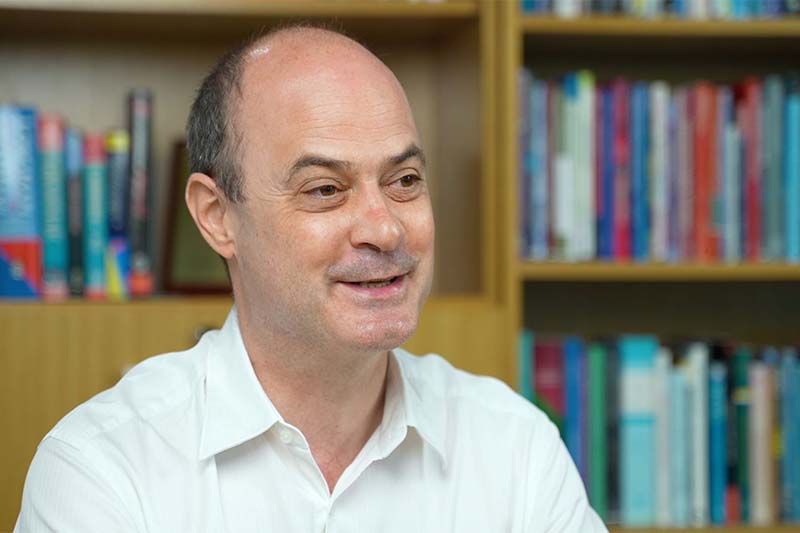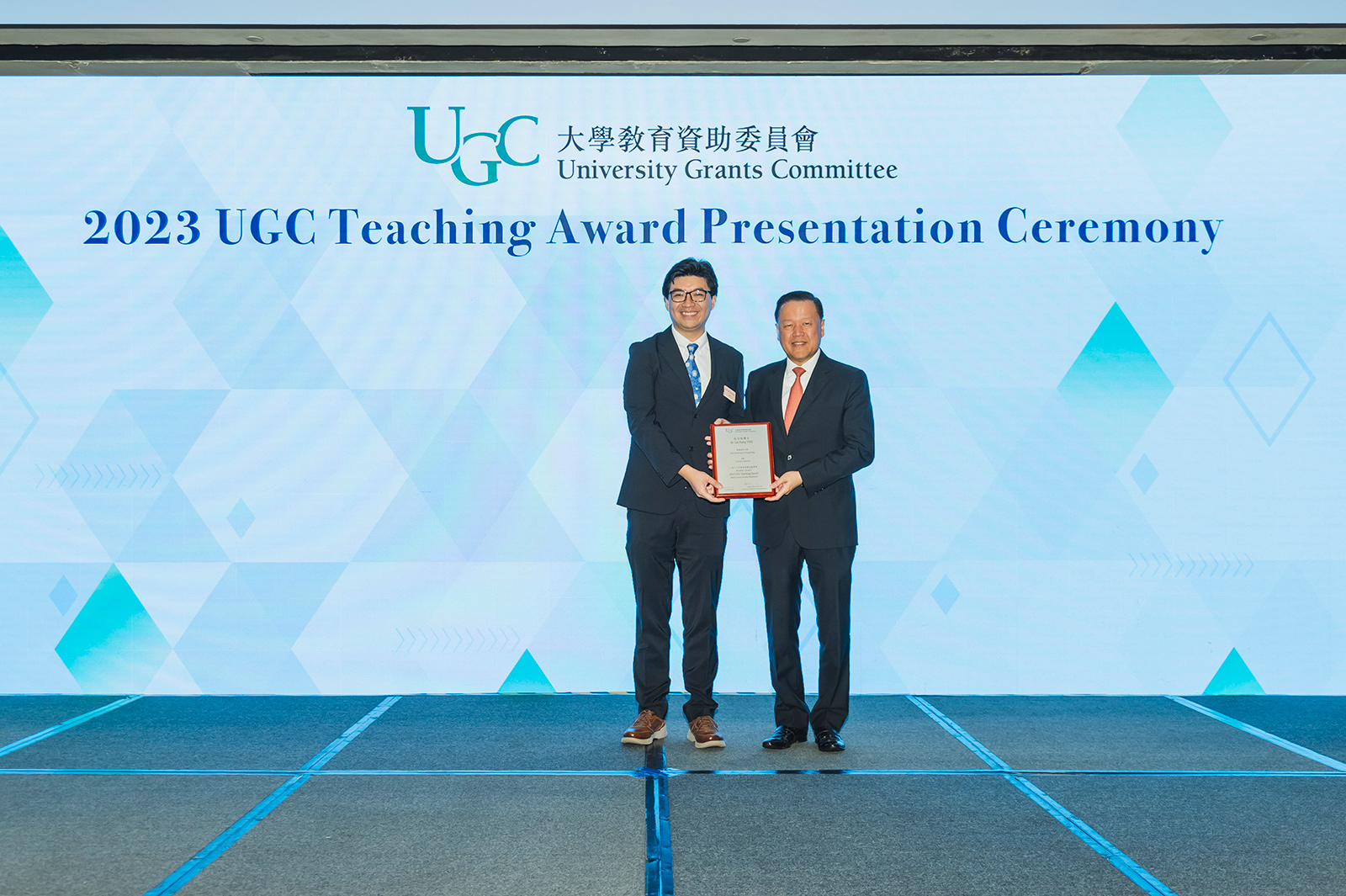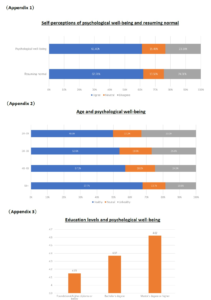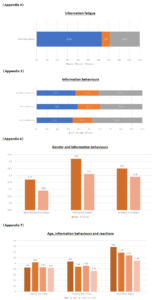
Empowering Novices to become Experts: Impact of the Legal English Project 培養初學者成爲專家:法律英語項目之影響
15 September 2023
傑出教學獎2023|城大教授將AI融入歷史教育 激發學生主動求證 (Chinese Version Only)
5 October 2023Survey Reveals Hong Kong Citizens Mentally Overcome Pandemic Gloom But Information Fatigue Looms

Principal investigator: Prof Christine HUANG Yi-hui (Department of Media and Communication)

Since the World Health Organization declared an end to COVID-19 as a public health emergency, Hong Kong citizens’ lives have gradually resumed normal. Professor Christine HUANG Yi-hui, Chair Professor of CityU’s Department of Media and Communication (COM), and her research team* conducted online surveys with 1,913 Hong Kong citizens aged 20+ from April to July 2023. The objective is to understand their perceptions of psychological, living and interpersonal well-being.
The major findings are as follows:
Citizens’ self-perceived psychological well-being
1. Over 60% of the respondents considered their psychological well-being healthy (61.4%) and expressed that their current health, living and work conditions have returned to pre-pandemic levels (62.2%). (See Appendix 1);
2. Older respondents have better self-perceptions of psychological well-being. Nearly 70% of the respondents aged 50 or above (67.7%) considered their psychological conditions positive. However, among respondents aged 20 – 29, less than half (49.8%) hold a positive view of their psychological condition. (See Appendix 2);
3. There is a significant correlation between education levels and positive psychological self-perceptions among citizens: Citizens with higher education tend to experience improved psychological well-being after the pandemic. (See Appendix 3)
Post-pandemic consequences
4. Most respondents expressed fatigue towards COVID-19-related information. Over 60% of the respondents (63.0%) indicated they felt tired and stressed receiving pandemic-related news and updates due to the excessive and complex information on the pandemic they had received before. (See Appendix 4);
5. Around 40% of the respondents no longer actively search for COVID-19-related information (41.5%) or share pandemic-related updates (40.1%). Furthermore, 34.1% of the respondents indicated avoiding pandemic-related information. (See Appendix 5);
6. A polarising trend is observed in the active and passive information behaviours (searching, sharing information, and avoiding pandemic-related updates) among the group of young respondents aged 20-39 and the male group;
a. Male respondents’ active behaviours in searching for and sharing information are significantly higher than that of the female respondents. However, when asked about their information avoidance behaviour, male respondents showed a higher tendency to avoid such information across various media platforms (including television, social media, etc.) than female respondents. (See Appendix 6);
b. The young respondents (aged 20-39) also show a significant polarisation in information processing compared to other age groups. On one hand, they tend to engage in more frequent information sharing. On the other hand, they also indicate a higher tendency to avoid reading and receiving relevant information than other age groups. (See Appendix 7)
7. The study also found that social trust promotes people’s willingness to share and search for information. It also helps alleviate information fatigue and avoidance behaviours. Specifically, when citizens have higher levels of trust in their family members, relatives, colleagues, friends, etc., they are more likely to obtain and share pandemic-related information through various channels. They also tend to avoid receiving pandemic-related information less frequently.
Prof Christine Huang Yi-hui hopes that this study can contribute to understanding Hong Kong citizens’ psychological well-being and information processing behaviours in the post-pandemic period and assist the government in formulating effective policies and communication strategies. “In the post-pandemic period, Hong Kong citizens generally have a good and positive self-perception of their psychological well-being. However, there are differences among different age and educational groups. Specifically, young citizens with lower educational levels tend to have lower self-ratings of psychological well-being. Society should pay more attention to the psychological conditions of this group and provide appropriate social support,” she remarks.
Huang says, “The data displays a decline in public interest in pandemic-related information, indicating the phenomenon of ‘information fatigue’. This is one of the pandemic’s consequences and a double-edged sword of such a situation. The advantage is that people become more positive in their attitudes towards themselves and their lives, which will greatly facilitate social and economic development. However, it is important to note that when public interest in pandemic information decreases, there is a possibility of the ‘out of sight, out of mind’ phenomenon, which may undermine the effectiveness of post-pandemic public health campaigns and health communication. Strengthening public awareness and cooperation in disease prevention will be a challenge for the government. From the communication studies perspective, adopting a ‘narrative communication’ strategy may increase public interest in relevant information.
However, the study indicates that around 40% of the respondents have yet to overcome the pandemic gloom. Prof Chris SHEN Fei says, “To help citizens cope with the consequential challenge of post-pandemic, the government and relevant organisations should provide psychological support, strengthen mental health services and counselling, and enhance social trust among citizens to support them in dealing with anxiety and stress. They should also focus on the scientific nature of health persuasion communication, such as providing accurate and clear information, reducing information redundancy, and alleviating citizens’ fatigue towards pandemic information.”
Prof Nancy DAI Yue says, “The dual behaviour observed among young people and men in Hong Kong—actively sharing while avoiding reading pandemic news—indicates that the government and relevant departments need to consider the unique information acquisition and consumption patterns of different population groups to formulate communication strategies. It also means that information regarding pandemic prevention and control needs to be concise, engaging, and easily comprehensible in the post-pandemic period to enhance public reception, dissemination, and comprehension of such information.”
Prof WANG Yuan remarks, “In the post-pandemic era when Hong Kong society is returning to normal, the government and organisations concerned still need to continue utilising existing platforms to disseminate an appropriate and necessary amount of pandemic prevention information. Meanwhile, research should be done to identify the most effective mechanism for information dissemination, helping citizens improve their information literacy and overcome information fatigue. It will enable more effective dissemination of pandemic prevention messages to the general public in the future when faced with other public health events. It will also enhance their ability to discern misinformation.”
*The research team consists of the faculty members of COM including Prof Christine HUANG Yi-hui (Chair Professor), Prof Chris SHEN Fei (Associate Professor), Prof LIN Fen (Associate Professor), Prof Crystal JIANG Li (Associate Professor), Prof SUN Ye (Associate Professor), Prof Nancy DAI Yue (Assistant Professor), Prof WANG Yuan (Assistant Professor) and Prof Vincent WANG Xiaohui (Assistant Professor) as well as PhD students including LIU Ruoheng, LIU Haodong, CAI Qinxian, ZHANG Leyi, Jennifer LAU and SUN Jie.

